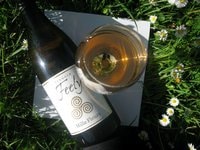Sulfites in wine – what it is and why you should care
Sulfites are added to wine as a preservative. Sulphur dioxide (sulfites) is used in the wine as a preservative and as a cleaning agent in the winery.
At legislated EU maximum levels for conventional white wine (200mg/litre) a 65 kg person reaches their maximum at less than a third of a bottle of white wine.
Taking the example of dry red wine – in the EU the conventional wine total sulfites max is 150mg/litre and the organic wine max is 100mg/litre. With certified organic dry red wine you can enjoy two glasses and stay well within the recommended level.
Biodynamic is stricter than organic, the maximum sulphite limits are lower than for organic wines: Demeter is 90 mg / l for dry white and rosé wines and 70 mg / l for dry red wines ; Biodyvin is 105 mg / l for dry white and rosé wines and 80 mg / l for dry red wines.
Personally we only drink organic (and ideally biodynamic) wine and prefer it to be low sulfite or sulfite free.

I often hear 'it's impossible to be sulfite free- winemaking creates sulfites in wine'. A few articles say this can be anything from 6 to 40 mg/litre. Analysis of our wines that are no sulfite added shows no quantifiable sulphites so despite having read and heard, like so many, that sulfites are generated in winemaking our wines don't show this.
Natural winegrowers can make wines that are just grapes and nothing but grapes and not lose the wines to oxidation because of higher natural acidity and higher natural antioxidants that are created by organic and biodynamic farming. Higher natural antioxidants like resveratrol (see Caros book Saving our Skins) because the vines create antioxidants when they are attacked by pests and diseases and if they have been treated with systemic pesticides they will not be attacked (and won't create these things that are ironically good for us). Higher natural acidity because chemical fertiliser lowers acidity that found in the grapes grown on chemical fertilisers. The higher the acidity the lower the sulfites need to be as more free SO2 is available.
If you are sensitive to sulfites beware of them in other products (not just wine) for example cured ham, salami, smoked fish (and other fish), dried fruit (and nuts), fruit juice and many others.
See our series on why organic and read more about biodynamics. visit to Chateau Feely in South West France ; stay with us or do a multi day course or multi day tour . Read about the story of this organic vineyard in the Vineyard SeriesCaro Feely Books with Links and ISBNs .
Join our mailing list to receive our newsletter – wine school, wine pairing, recipes and more- at the bottom right of this page.









